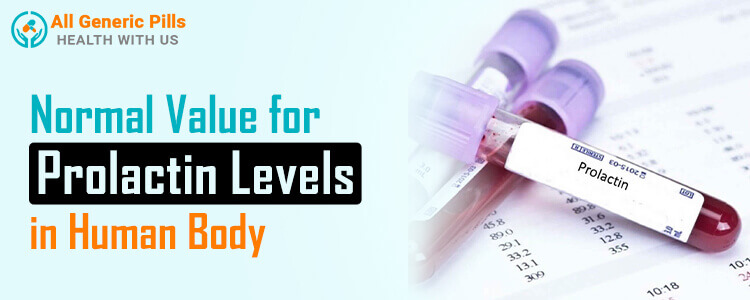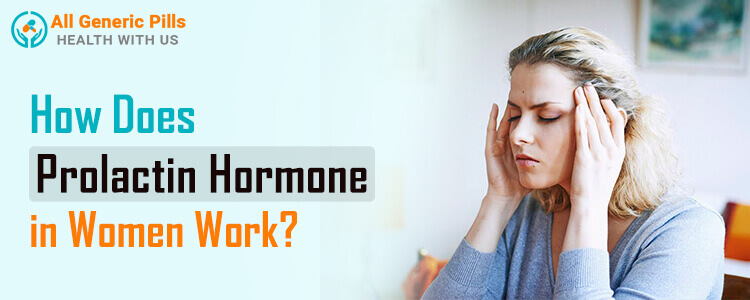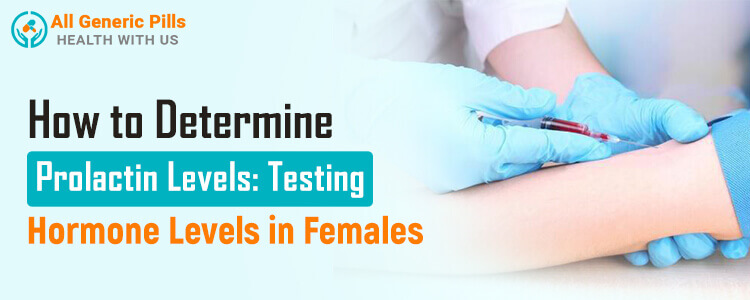Sorry, nothing in cart.

Prolactin Hormone in Women – Description, Function, Symptoms, and Causes
Prolactin Hormone in Women is associated with breast development and milk production during pregnancy. This hormone is released by the pituitary gland which resides at the base of your brain. Levels of prolactin directly impact your body. Therefore, it is suggested to consult your doctor if you have irregular periods or find difficulty getting pregnant or milky discharge when not pregnant.
What is Prolactin Hormone?

PRL or Prolactin or lactotropin is a mono chain of 23 kda polypeptide hormone (hormones having proteins) that comprises 198 amino acids, it is formed and secrets in the lactograph cells of the anterior pituitary gland. Its secretion is volatile and rises with sleep, stress, indigestion, chest pain, and during pregnancy.
Our medical history, eating habits, workout efficiency, physical, and psychological stress determine our Prolactin levels (which may vary accordingly).
Several treatments are there to help you restore prolactin levels like oral medications or directly injecting medications into the vagina.
This article will cover causes, synonyms, and cute for prolactin levels in women.
Normal Value for Prolactin Levels in Human Body

Normal prolactin levels vary in men and women, and the values in blood are listed below:
- Non-pregnant women – 2-29 nanograms per milliliter
- Pregnant women- 10-209 nanograms per milliliter
- For males – 2-18 nanograms per milliliter
How Does Prolactin Hormone in Women Work?

When a woman is pregnant, a pea-sized pituitary gland (which is a part of the endocrine gland) present at the bottom of her brain (of your hypothalamus) starts releasing high amounts of Prolactin Hormone, which is used in developing mammary glands in her breast and producing milk for breastfeeding. However, the prolactin hormone helps generate sex desires, erection, and sperms in men.
Besides the pituitary gland, several parts of your body like CNS (Central Nervous System), immune system, uterus, and mammary glands can also produce prolactin in your body. Several factors that contribute to this hormone production in the above said tissues are:
- Nipple stimulation
- Stress
- Extreme Workouts
However, to prevent the overflow of prolactin, the pituitary gland starts releasing Dopamine (a happy hormone) and estrogen. These hormones are prolactin inhibiting factors or PFIs that counteract hyperlactatemia (as high levels of prolactin could be dangerous for your body).
How to Determine Prolactin Levels: Testing Hormone Levels in Females

Blood tests can help doctors diagnose if you have Hyperprolactinemia or not.
First, the lab assistant takes your blood sample for a test. The value of prolactin hormone in women may come high if you’re getting tested with a full stomach or in stress.
Second: In the second round, you give a sample when you are empty stomach and relaxed. If the result matches with the first round, doctors check the list of medicine you’re taking currently and start your prolactin medicine course.
However, in any case, if your current medicines keep your prolactin high, the doctor helps you with alternate medicines that suit you and add a medication that would bring the prolactin level down. Usually, they start with a low dose of prolactin medication.
If the results are not good, they slowly increase the dose until your prolactin level restores. Your doctor stops your prolactin course once you are pregnant.
Important note: If you find any side effects of the medicine, consult your physician immediately.
High Prolactin Levels: Signs & Symptoms

The following indications acknowledge you of high prolactin levels or hyperprolactinemia:
- Infertility
- Galactorrhea (lactation in non-pregnant women)
- Irregular menstruation
- Amenorrhea (stopping of periods)
- Loss of Libido (loss of sex drive)
- Breast pain
- Vaginal dryness
These symptoms are found in women. However, hyperprolactinemia causes the following issues in men:
- Erectile Dysfunction
- Gynecomastia – Enlarged breast tissues
- Loss of sex drive
- Galactorrhea (rare cases)
- Less or no sperm production
Causes for Hyperprolactinemia

Reasons for Hyperprolactinemia incorporate the following:
- Hypothyroidism (low thyroid hormone levels)
- Chronic kidney disease
- Antidepressants like Alcohol, Sertraline, Citalopram, Fluvoxamine
- Antipsychotics like Aripiprzole, Caripiprazine, Clozapine
- Antihypertensives like Isradipine, Felodipine, Verapamil
- Anti-nausea medications like Zofran, Phenergan, Reglan
- Stress – physical like over-exercising, and psychological like anxiety, depression
- Chest wall injury
- Shingles
- Tumors in or near your pituitary gland
- Nipple stimulation
- Herbs like fenugreek, fennel seeds, and red clover
Medications for high Levels of Prolactin

- Medications for anti-psychotics like risperidone
- High BP medications
- Pain relievers
- Medications for nausea and vomiting
Note: “Please make sure that you discuss your medical history and the list of medicine before starting your treatment for Hyperprolactinemia.”
Low Prolactin Levels: Symptoms

Prolactin levels in human blood stay normal until you’re pregnant.
However, when the prolactin hormone is low after pregnancy, the reason comes out to be a lack of breast milk production.
Often, hypopituitarism is the reason for lowering prolactin. Hypopituitarism is caused by extreme pressure on your pituitary gland or even damage. The result is that the pituitary gland stops making and releasing hormones, which creates a deficiency in prolactin hormone in women.
The following drugs may lower prolactin levels in humans:
- Dopamine (Intropin) – Used for treating patients having heart failure, kidney failure, trauma, surgery, or any typical health issue.
- Ergot Alkaloid Derivatives are compounds we derive from the fungal parasite Ergot and Claviceps Purpurea. We use Ergot for treating migraine, suppressing prolactin secretion, and vasoconstriction.
- Parkinson’s disease – A brain disorder in which a person finds difficulty in controlling and balancing, which causes uncontrollable movements like shaking and stiffness.
Please note that low levels of prolactin do not require medications.
How to Treat High Levels of Prolactin?

Two medicines are helpful when treating Hyperprolactinemia, and they are Parlodel and Dostinex.
Parlodel has bromocriptine and Dostinex has Cabergoline as an active ingredient.
Both are effective in restoring prolactin levels and shrinking pituitary tumors in women.
Among the two, taking Cabergoline is taken twice a week is better as it has fewer side effects than Bromocriptine. Also, it restores prolactin levels faster than bromocriptine.
Side effects of both medicines include lightheadedness, nausea, vomiting, and headache.
However, an alternative to subside the side effects is passing bromocriptine directly to the vagina through a suppository.
Often surgery is needed to remove tumors in the pituitary gland if medicines are not giving effective results. If surgery fails, radiation is used for removing the tumor.
Key Take Aways: Is there a Permanent Cure for Prolactin?

Yes. There is a permanent cure for lower or higher levels of prolactin hormone in women. However, you will have to go through a long-term medicinal course to recover completely. Salts like Cabergoline and Bromocriptine bring prolactin levels to normal.
